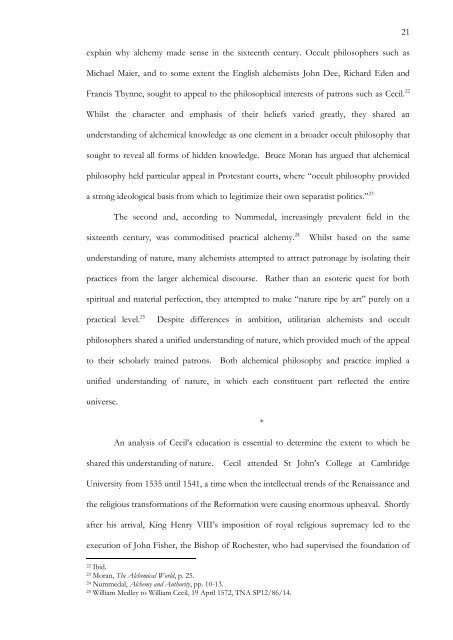The Alchemical Patronage of Sir William Cecil, Lord Burghley
The Alchemical Patronage of Sir William Cecil, Lord Burghley
The Alchemical Patronage of Sir William Cecil, Lord Burghley
You also want an ePaper? Increase the reach of your titles
YUMPU automatically turns print PDFs into web optimized ePapers that Google loves.
explain why alchemy made sense in the sixteenth century. Occult philosophers such as<br />
Michael Maier, and to some extent the English alchemists John Dee, Richard Eden and<br />
Francis Thynne, sought to appeal to the philosophical interests <strong>of</strong> patrons such as <strong>Cecil</strong>. 22<br />
Whilst the character and emphasis <strong>of</strong> their beliefs varied greatly, they shared an<br />
understanding <strong>of</strong> alchemical knowledge as one element in a broader occult philosophy that<br />
sought to reveal all forms <strong>of</strong> hidden knowledge. Bruce Moran has argued that alchemical<br />
philosophy held particular appeal in Protestant courts, where ―occult philosophy provided<br />
a strong ideological basis from which to legitimize their own separatist politics.‖ 23<br />
<strong>The</strong> second and, according to Nummedal, increasingly prevalent field in the<br />
sixteenth century, was commoditised practical alchemy. 24 Whilst based on the same<br />
understanding <strong>of</strong> nature, many alchemists attempted to attract patronage by isolating their<br />
practices from the larger alchemical discourse. Rather than an esoteric quest for both<br />
spiritual and material perfection, they attempted to make ―nature ripe by art‖ purely on a<br />
practical level. 25 Despite differences in ambition, utilitarian alchemists and occult<br />
philosophers shared a unified understanding <strong>of</strong> nature, which provided much <strong>of</strong> the appeal<br />
to their scholarly trained patrons. Both alchemical philosophy and practice implied a<br />
unified understanding <strong>of</strong> nature, in which each constituent part reflected the entire<br />
universe.<br />
*<br />
An analysis <strong>of</strong> <strong>Cecil</strong>‘s education is essential to determine the extent to which he<br />
shared this understanding <strong>of</strong> nature. <strong>Cecil</strong> attended St John‘s College at Cambridge<br />
University from 1535 until 1541, a time when the intellectual trends <strong>of</strong> the Renaissance and<br />
the religious transformations <strong>of</strong> the Reformation were causing enormous upheaval. Shortly<br />
after his arrival, King Henry VIII‘s imposition <strong>of</strong> royal religious supremacy led to the<br />
execution <strong>of</strong> John Fisher, the Bishop <strong>of</strong> Rochester, who had supervised the foundation <strong>of</strong><br />
22 Ibid.<br />
23 Moran, <strong>The</strong> <strong>Alchemical</strong> World, p. 25.<br />
24 Nummedal, Alchemy and Authority, pp. 10-13.<br />
25 <strong>William</strong> Medley to <strong>William</strong> <strong>Cecil</strong>, 19 April 1572, TNA SP12/86/14.<br />
21















